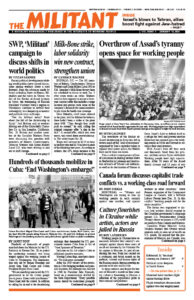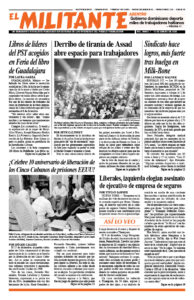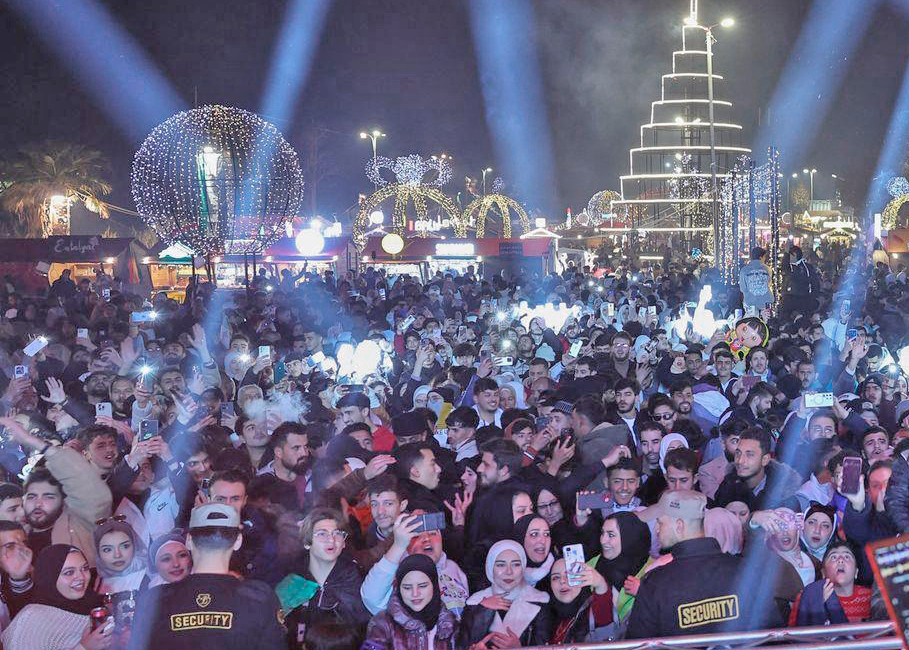The overthrow of the Bashar al-Assad dictatorship in Syria has left in tatters much of the “axis of resistance” organized by Iran’s capitalist rulers to expand their power across the Middle East and to wipe out Israel.
This is a direct consequence of Israel’s successes in dealing serious blows to Hezbollah in Lebanon and destruction of much of Tehran’s air defenses, as well as its decimation of Hamas in Gaza. Israel’s fight to defend itself as a refuge for Jews and prevent another Holocaust has opened space for working people in Syria and beyond to advance their own interests.
With Assad’s boot off their neck and thousands freed from his prisons, millions across Syria celebrated. Working people have high expectations. After 50 years of the Assad family tyranny and 13 years of war some 75% of the 20 million people in Syria are living on $3.65 a day or less.
Working people there also face intervention from rival capitalist governments, from Washington to Turkey and beyond. Each is jockeying for position and pushing their own economic and political interests. It remains to be seen if the heterogeneous rebel coalition can put together a functioning government and which outside forces have the most influence.
Assad’s hold over the two-thirds of the country that he controlled disintegrated when he could no longer count on thousands of Hezbollah thugs, Iranian troops and Russian air support to come to his rescue. With Turkish support, a rebel coalition — led by the Sunni Islamist group Hayat Tahrir al-Sham — forced Assad to flee.
Tahrir al-Sham says it broke from al-Qaeda and Islamic State in 2016. It portrays the rebel coalition as moderate in a bid to win economic aid and an end to sanctions imposed by Washington and other imperialist powers. It promises a “free market” and respect for religious and ethnic minorities — Alawites, Christians, Druze, Kurds and others — under Islamist rule.
Turkish diplomats were the first to meet with Tahrir al-Sham leader Ahmad al-Sharaa in Damascus. Ankara had been providing electricity to the rebel stronghold in Idlib in northern Syria and is extending the power lines to Aleppo. This will help make up for the cutoff of oil supplies from Iran.
A high-level U.S. delegation met with Sharaa in Damascus Dec. 20. “It was a good meeting,” Assistant Secretary of State for Near Eastern Affairs Barbara Leaf said. Washington dropped a “reward” it had been offering for the capture of Sharaa, although Tahrir al-Sham remains on the State Department’s terrorist list.
Leading up to Assad’s overthrow, Washington increased the number of U.S. troops in northern Syria from 900 to 2,000, largely stationed alongside Kurdish forces in the Northeast. This is aimed at defending U.S. imperialist interests in the region, not defending the Kurdish-led Syrian Democratic Forces, which has come under attack from pro-Turkish government forces.
Delegations from the United Kingdom, France, Germany, Ukraine, Qatar, Jordan, Iraq and Bahrain have also met with leaders of the transitional government. Syria’s new foreign minister has been invited for talks in Saudi Arabia.
Moscow still has a key naval base and an air base on Syria’s Mediterranean coast. “We don’t want Russia to exit Syria in the way that some wish,” Sharaa told Al-Arabiya television. Moscow had previously served as a key military prop for the Assad dictatorship. Sharaa noted that “all of Syria’s arms are of Russian origin, and many power plants are managed by Russian experts.”
Kurds dialogue with Islamist leaders
The Turkish-created Syrian National Army — a part of the rebel coalition — occupies a swath of Syrian territory along the northern border, aimed at corralling in the Syrian Democratic Forces. Ankara accuses the SDF of backing the Kurdistan Workers’ Party (PKK), an armed Kurdish group in Turkey.
There are some 30 million Kurds — an oppressed nationality — in Iraq, Iran, Syria and Turkey. The Turkish government fears that any advances for Kurds in Syria will strengthen the struggle for national rights by Kurds in Turkey.
According to the Kurdish news agency Rudaw, the SDF has directed all institutions in the autonomous area it controls to fly the new “flag of the revolution” and has banned display of PKK flags and symbols.
Sharaa says he wants to dissolve all the armed groups into a new national army, including the Kurds. The SDF and the new government held a “preliminary meeting” Dec. 30.
Sharaa also told the press, “We do not want any conflict whether with Israel or anyone else.”
The Israeli government is skeptical about the recent transformation of Tahrir al-Sham. Aisha al-Dibs, named as the head of the new regime’s Office for Women’s Affairs, has repeatedly praised Hamas’ Oct. 7 pogrom and called for the destruction of Israel.
Israeli leaders are also concerned about the growing influence of Ankara in Syria. Turkish President Recep Tayyip Erdogan has denounced Israel’s war on Hamas, praised the Jew-hating group and has ties to the Muslim Brotherhood, as does Hamas. At the same time, Ankara still maintains some diplomatic relations with Israel.
Working people in Syria are putting their stamp on developments. Hundreds of Christians marched through Damascus on Christmas Eve after eight Islamist fighters vandalized a Christmas tree in the city of Suqaylabiyah. They called for an end to “injustice and sectarianism against Christians.”
Rebel leaders and Islamic clerics rapidly met with parish priest Father Maher Haddad. The tree was restored and the vandals arrested.


